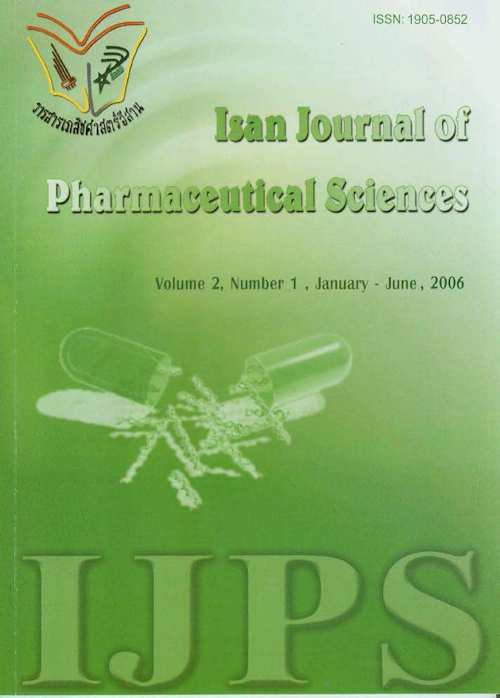Student’s Professionalism and Leadership Influenced by Pharmacy Education and Institutional Socialization
Main Article Content
Abstract
Professionalism and leadership are crucial factors for being a good pharmacy practitioner. In the academic year of 2005, Pharmacy students of Mahasarakham University (MSU) were surveyed using a one-year analytical cross-sectional study. The objectives were to examine the effects of pharmacy education and institutional socialization on students’ professionalism and leadership. Overall, 400 pharmacy students from all six years of the course were selected to receive the self-administered questionnaire. Effects of pharmacy education and institutional socialization on professionalism and leadership were analyzed using multiple regression. A total of 311 (77.8%) usable questionnaires were returned for analysis. Significant factors affecting professionalism were students’ academic development through their institutional experience and their socialization (f3=0.351, p<0.0001), their leadership as an aspect of emotional control ((3=0.165. p=0.002), and their pride in the pharmacy profession ([3=0.157, p=0.007). These variables accounted for 31.2% of the variance in professionalism. In terms of รณdents’ leadership, their academic development from institutional experience and socialization showed the highest effect on the professionalism ((3=0.189, p=0.003). The pharmacy lecturers ((3=0.148, p=0.008) and the students’ professional sense of calling ((3=0.154, p=0.016) also showed effects on students’ leadership. These three variables accounted for 14.7% of the variance in students leadership. It was concluded that students’ professionalism and leadership were associated with their institutional experiences and socialization. Lecturers, friends, academic development, attitude to the profession, and the institutional environments were also important factors for developing and enhancing students’ professionalism and leadership. Pharmacy schools should take account of these factors and use them as the resources for setting their future strategic plans.
Article Details
In the case that some parts are used by others The author must Confirm that obtaining permission to use some of the original authors. And must attach evidence That the permission has been included
References
American Board of Internal Medicine. 1995. Project professionalism, www.abim.org.1-41. APhA-ASP/AACP-COD Task Force on Professionalism. 2000. White paper on pharmacy student professionalism. J. Am. Pharm. Assoc. 40:96-102.
Gloria, A.M. & Ho, T.A. 2003. Environmental. Social, and psychological experiences of Asian American undergraduates: Examining issues of academic persistence. J. Higher. Educ. 68: 599-623.
Goleman. 2002. The New Leaders: transforming the art of leadership into the science of results.
Greenwood, E. 1957. Social work. 2:45.
Hall, R.H. 1968. Professionalization and bureucratization. Am. Soc. Rev. 33(1): 92-104
Hammer, D.p. 2000. Professional attitudes and behaviors: the “A’s and b’s” of professionalism. Am. J. Pharm. Educ. 64:455-464.
Larkin, G. L., Binder, L., Houry, D., Adam, J. 2002. Defining and evaluating professionalism: a core competency for graduate emergency medicine education. Acad. Emer. Med. 9(11): 1249-1256.
Lerkiatbundit, ร. 2000. Professionalism in Thai pharmacy students. J. Soc Admin. Pharm. 17(l):51-58.
Pascarella, E.T. & Terenzini, P.T. 1991. How college affects students. San Francisco: Jossey-Bass.
Manesse, H.R., Stewart, J.E., Hall, R.H. 1975. Inconsistent socialization and disillusionment: the case of pharmacy. J. Am. Pharm. Assoc. 15: 616-21.
Schack, D.W., Hepler, C.D. 1979. Modification of Hall’s professionalism scale for use with pharmacists. Am. J. Pharm. Educ. 43: 98-104.
Snizek, W.E. 1972. Hall’s professionalism scale: an empirical reassessment. Am. Soc. Rev. 37:109.
Sooksriwongse, C., Poonsub, S., and Khoasamang, S. 1994. Attitude towards pharmacy profession by pharmacy students. Mahidol J. Pharm. Sci. 21: 68-76.
The American Association of College of Pharmacy. 2001. General educational outcomes. Am. J.Pharm. Educ. 323.
The American Heritage Dictionary. 1985. The Free Press. 719.
Tinto, V. 1975. Dropout from higher education: A theoretical synthesis of recent research. Rev.Ed.Res. 45:89-125.
Wilensky, H.L. 1964. The professionalization of everyone. Am J. Soc. 70:137-146.


